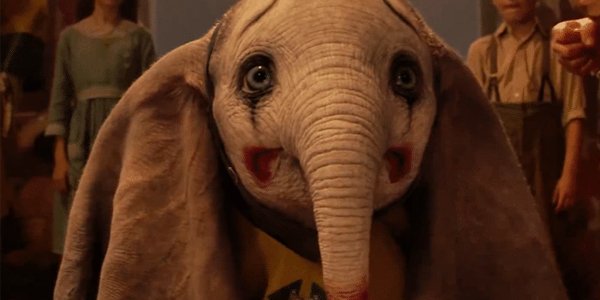Dumbo’s Original Source Material Remains A Mystery To This Day

Your Daily Blend of Entertainment News
You are now subscribed
Your newsletter sign-up was successful
In the discussion about Tim Burton’s Dumbo, most speak to its original source material as the 1941 Walt Disney Animated film of the same name – but while that’s not entirely wrong, it’s also not entirely right. While there is absolutely no questioning that the new film was heavily inspired by the classic cartoon, calling it the original source material ignores the fact that the first Dumbo movie was itself an adaptation. This by itself isn’t all that interesting, but what adds a few wrinkles to the situation is the fact that the first ever version of the story no longer appears to exist.
While the Disney film obviously popularized the tale of Dumbo, it was actually first envisioned by writers Helen Aberson and Harold Pearl and illustrator Helen Durney for a toy called a Roll-a-Book. It’s believed that a prototype was created, and there is some limited artwork still floating around, but apparently it’s impossible to actually find it.
This is not due to a lack of trying, however, as I learned earlier this month during the Los Angeles press day for the new live-action Dumbo. Having learned about this strange circumstance prior to seeing the Tim Burton film and become curious about it, I decided to inquire about the mystery of the Roll-a-Book during interviews with the movie’s producers. What I discovered was that efforts were definitely made to track down the original version of Dumbo, but nobody wound up having any luck.
I first sat down with producer Justin Springer and screenwriter Ehren Kruger, and right off the bat asked if they had any luck finding the mysterious invention. What I learned was that they did a full archive sweep shortly after development on the project started, and while they were able to find some incredible treasures that have been beautifully preserved by the Walt Disney Company, one item that wasn’t included with the wide variety of materials was the Roll-a-Book prototype. Springer explained,
It doesn't exist. Disney doesn't have it. As soon as Ehren and I started talking about it, we did go to the Disney archives and we were able to go to the animation archives and they pulled like 20 boxes of Dumbo stuff for us. And there were old treatments, and screenplays, and artwork, cell animation, early drawings, and model sheets. One of the opportunities at Disney is that you can go back to that source material and see what some of the original thinking was… But the Roll-a-Book itself was something that we found out about because we were doing research on where the original idea came from, and read about it. But we don't know that one exists.
The patent for the Roll-a-Book, filed November 2, 1938 and credited to inventor Everett Whitmyre, suggest that the device operated like an encased scroll that the user would navigate through with a pair of nobs. The reader would turn the nobs simultaneously, changing the image shown and letting the story continue. Specifically in the case of Dumbo, the story of a baby elephant with ears so giant that they allow him to fly.
Justin Springer and Ehren Kruger were unable to track down the Roll-a-Book, but interestingly it seems that their interest in digging through the archives was a touch contagious. The producer noted that the material they had found was passed along to Tim Burton and his team once they started becoming involved with Dumbo:
When I first met Tim [Burton] and Derek [Frey], when they were coming on-board the movie, I brought them a bunch of those files so that they could have them as well.
That was only the start for Derek Frey, though, as I later learned when I sat down with him and his producing partner Katterli Frauenfelder. During that interview I again opened by asking about the Roll-a-Book, and Frey admitted that the mystery was one that intrigued him as well in the making of Dumbo. And not only was it interesting to him, but it caught the attention of his wife Leah Gallo as well. Said Frey,
Your Daily Blend of Entertainment News
We looked [for the Roll-a-Book], and actually, my wife, who wrote the making-of book, she contacted Syracuse. I think it's Syracuse University has some kind of record of it, or maybe the original artwork. I don't think it's the Roll-a-Book itself, but they were so happy that we contacted them, because we wanted to get the information on like where did this originally come from? Obviously everybody thinks of the Disney animated picture, but they got the rights to do it based off of that little Roll-a-Book. So it's interesting.
If you can’t tell where this is going, however, the efforts ultimately didn’t bear any real fruit. Even with all of the resources of the Walt Disney Company supporting the search, the original Roll-a-Book prototype that inspired Dumbo remains a lost item… if you can even call it lost, given how it’s unclear whether or not it ever physically existed. Derek Frey summed it up this way:
From what I understand, it's kind of like one of these myths. There was a Roll-a-Book being planned. I guess the fact is I don't know if anyone's actually found a physical copy of one. I think there's imagery of it, or artwork that was created for it, and there could have been like maybe like a prototype created for it. But I don't think there's actually a physical Roll-a-Book. We didn't have one, but we looked.
Frankly, this sounds like a case where the thing will randomly turn up in someone’s basement someday, with the person in possession of it being totally and entirely clueless about its pop culture significance. But until that day comes, we’ll just have to live with the material we know exists.
On that note, the original Walt Disney Animation classic Dumbo is widely available on Blu-ray, DVD, and digital. And if you're curious about the new live-action take, Tim Burton’s Dumbo – starring Colin Farrell, Nico Parker, Finley Hobbins, Eva Green, Danny DeVito, Michael Keaton, and Alan Arkin – is now playing in theaters everywhere worldwide.

Eric Eisenberg is the Assistant Managing Editor at CinemaBlend. After graduating Boston University and earning a bachelor’s degree in journalism, he took a part-time job as a staff writer for CinemaBlend, and after six months was offered the opportunity to move to Los Angeles and take on a newly created West Coast Editor position. Over a decade later, he's continuing to advance his interests and expertise. In addition to conducting filmmaker interviews and contributing to the news and feature content of the site, Eric also oversees the Movie Reviews section, writes the the weekend box office report (published Sundays), and is the site's resident Stephen King expert. He has two King-related columns.
